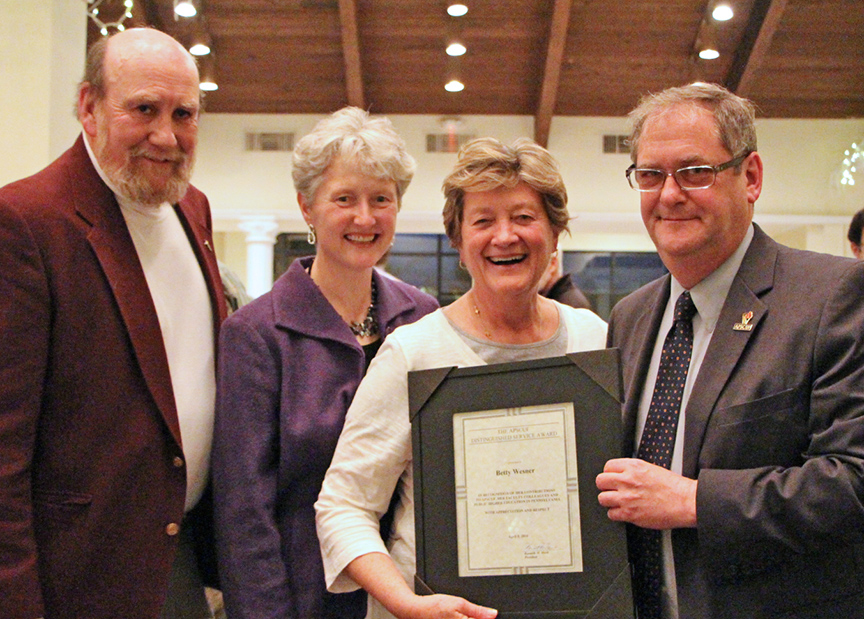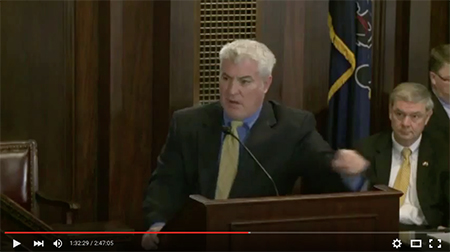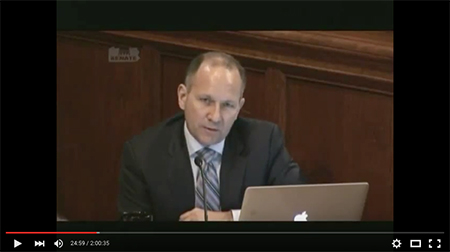Blog
Contract negotiations end in anger and frustration – April 28, 2016
Click here to read APSCUF’s press release about today’s contract negotiations.
Statewide officers elected at April assembly
Here’s the slate of officers elected at APSCUF’s April legislative assembly:
President: Dr. Kenneth M. Mash (East Stroudsburg)
Vice president: Jamie Martin (Indiana)
Secretary: Michele Papakie (Indiana)
Treasurer: Chris Hallen (Bloomsburg)
Coach executive leader: John Gump (Kutztown)
Audit committee: Eric Hawrelak (Bloomsburg), B.J. Mullaney (Cheyney); and Itzi Meztli (Slippery Rock)
Budget committee: Debra Cornelius (Shippensburg) Joe Miele (East Stroudsburg), and Susan Drummond (Indiana)
Members honored for APSCUF service

From left are former APSCUF President William Fulmer, Clarion University; former Mansfield University field hockey coach Diane Monkiewicz, who introduced Distinguished Service Award winner Betty Wesner; Wesner; and APSCUF President Dr. Kenneth M. Mash. Photo/Kathryn Morton
Betty Wesner won APSCUF’s Distinguished Service Award — which is given to members who voluntarily contribute their time and skills to the functions of APSCUF at the statewide level — at the organization’s legislative assembly in State College last week.
Wesner is retired from Kutztown University, where she was field hockey coach. Click here to read more about her.
For some, this was a final legislative assembly in their current leadership positions. State President Dr. Kenneth M. Mash expressed his appreciation for the service of: Steve Hicks, immediate past state president, of Lock Haven; Helen Bieber, secretary, retiring from Kutztown; Beth MacDaniel, chapter president, retiring from Clarion; Jean Jones, chapter president, retiring from Edinboro; Brendan Finucane, Shippensburg chapter president, who did not run for reelection; Mark Staszkiewicz, chapter president, retiring from Indiana; Keith White of Kutztown, stepping down from his position as coach executive leader; and Paul Quinn, outgoing Kutztown chapter president.
Read APSCUF’s positions on Degrees of Value report, per-credit tuition
Delegates at APSCUF’s legislative assembly last week in State College approved two position statements, posted now on the APSCUF website.
Degrees of Value report
The first statement, approved unanimously, regarded the Pennsylvania State System of Higher Education’s Degrees of Value report.
“At this point, the purpose of the Degrees of Value document appears to be an indictment of not only the liberal arts majors but also a signal that proposed changes are on the way,” the statement concludes. “The document is a leverage tool. All faculty should familiarize themselves with the report and be prepared to respond.”
Read APSCUF’s complete response, which includes points for faculty members to make when discussing the report with students, by clicking here.
Per-credit tuition
At budget-appropriations hearings last month, legislators in the House and Senate lauded so-called pilot per-credit tuition programs, already implemented at Millersville University and set to begin at Indiana University in the fall.
Rep. Keith J. Greiner said he was impressed with the preliminary data and sees advantages to Millersville University’s program:
Sen. Lloyd Smucker later called it “very innovative”:
State System Chancellor Frank T. Brogan said, “We found that it was having either no impact, negative, or positive impact in some of the issues that we reviewed.”
APSCUF faculty and coaches, tasked with providing quality, affordable education for their students, disagree. (So does this IUP parent, in this letter to the Pittsburgh Post-Gazette.)
An overwhelming majority of delegates approved APSCUF’s stance on per-credit tuition.
A bit of background: APSCUF delegates last year unanimously approved a resolution calling for a moratorium on per-credit pilots.
For a student taking 15 hours, a per-credit tuition programs increases the scholar’s tuition by 25 percent. For 18 hours, tuition goes up 50 percent from the previous flat rate.
“These pilot programs come at a time when the average Pennsylvania student already graduates from the State System with over $30,000 in debt,” the 2015 resolution reads. “From a national perspective, Pennsylvania ranks third-highest in student loan debt. Nearly 80 percent of PASSHE students accept some form of financial aid. These tuition increases will place an even greater financial burden on students and their families.”
This year’s position statement succinctly restates APSCUF’s opposition to the programs:
The Association of Pennsylvania State College and University Faculties confirms its opposition to per-credit tuition programs, and we reaffirm that the obligation to adequately fund public higher education rests squarely with the Pennsylvania General Assembly.
In solidarity with Verizon workers

APSCUF took breakfast to Verizon workers on strike yesterday in Harrisburg. Read more about the strike on the Communication Workers of America website by clicking here. Watch a Washington Post video about why Verizon workers are on strike here.

